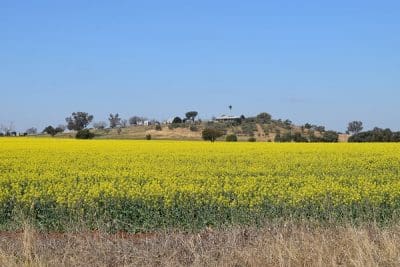THE ban on genetically modified (GM) crops in South Australia is likely to be extended after the state’s Upper House passed, by one vote, a Greens motion to extend the prohibition to 2025.
 The bill is yet to go to the Lower House where it is expected to pass, extending by six years the current ban which is due to expire on September 1, 2019.
The bill is yet to go to the Lower House where it is expected to pass, extending by six years the current ban which is due to expire on September 1, 2019.
Grain Producers SA chairman, Wade Dabinett, said the move to extend the moratorium was “an unmitigated disaster” for the grain industry in SA.
“I am completely gobsmacked that in 2017 we have a policy that has been in place in SA for 10 years on a matter which has caused no issues in other states in eastern Australia and WA. Yet we have a position here in SA where there has been no independent inquiry or justification as to where in the economy this moratorium is adding benefit,” he said.
“We really need a panel of experts to come together and do the work on whether this moratorium is benefiting the economy, because in the grains and ag sector we are not seeing it.
“I would like to know why the politicians voting for this are operating at a higher intellectual level than the productivity committee? The committee handed down a report that said the moratorium should be removed because it is costing the economy.”
Mr Dabinett, who farms at Parilla near the SA/Victorian border, said the issue was continuing to be used as a political football and without justification.
“That really alarms us. We are a decade behind now. What they are proposing is we go a further decade behind. That’s 20 years of access to a technology afforded to our competitors,” he said.
The Federal Assistant Minister for Agriculture and Water Resources and Senator for South Australia, Anne Ruston, said the flagged extension of the ban was not only a threat to innovation in agriculture.
“It further threatens South Australia’s agricultural research sector. Research dollars will bypass SA, seeking more open-minded states which don’t play politic games with the livelihoods of farming families,” Minister Ruston said.
SA and Tasmania are the only two states with a ban on growing GM crops. Prior to the likely extension to 2025, the SA Government had in place a ban until September 1, 2019. The ban in Tasmania is indefinite.
Not only is there a ban on growing GM crops in SA, the legislation also prohibits the importation into SA of any plant or plant material that forms part of a GM food crop grown outside the state.


Extending SA’s moratorium on Genetically Manipulated canola allows the state to continue its market access advantage in Europe and premiums for GM-free farmers and the food industry. GM-free premiums were paid for canola in WA, Victoria, NSW and SA last week and the long-standing discounts for GM are set to continue. For instance, compare the prices in Hamilton (Victoria), with Tailem Bend (SA). The silos are not far from each other, though in different states, and both are far from the ports. Hamilton silo paid $530/tonne for GM-free and $466/tonne for GM canola, a premium of $64/tonne. And Tailem Bend silo paid $545/tonne for SA’s GM-free canola – $15 more than Hamilton – that’s $79/tonne more for being GM-free. As a University of Adelaide Report found last year, there are “Opportunities for non-GM Labelled Food Products from South Australia.” GM-free is the way to be.
Another example of Luddite politicians ignoring peer reviewed scientific research, and preventing South Australian farmers having access to the latest farming technology that they (the farmers) have paid for through their levies.
South Australia is reputed to be an economically backward State with high unemployment and lack of investment in industry, compared to other States > politicians with attitudes like this would certainly be a disincentive to investors.